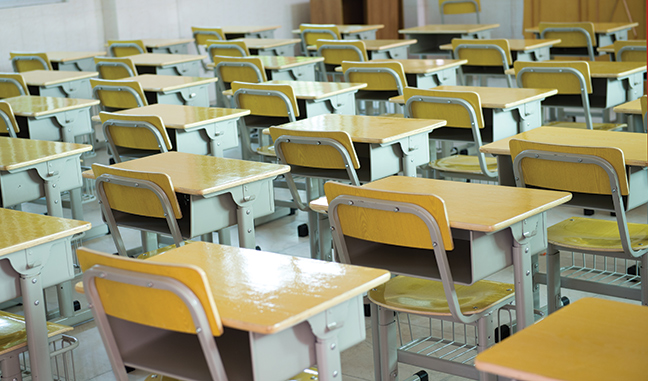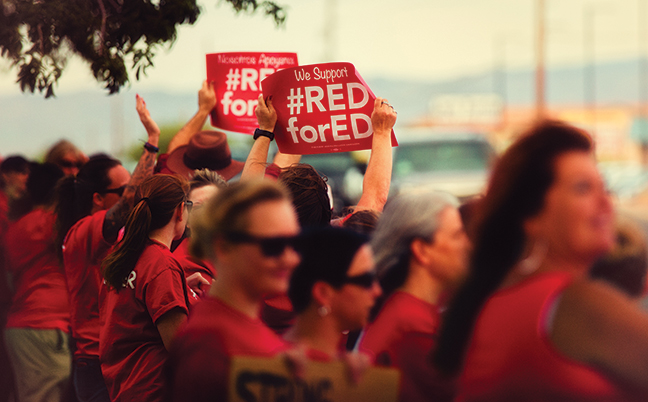BY JOSEPH DESTEFANO
Across the nation, in red states and blue, in rural districts, urban, and suburban, public school teachers are raising their voices and making a stand. They are organizing themselves, and insisting we recognize the struggle of their every day—what that struggle is, and what is at stake in it. Their demands may differ a little from one place to another, but whether in Los Angeles, the second largest school district in the country, or in West Virginia, where it is illegal to strike altogether, the success of their demonstrations are less about any concession they might earn than about the support they garner from us. Without strong and lasting support from their communities—from our own communities, the gains they make will prove paltry in the end. The public school teachers are calling on us to share their resolve.
Now, I am a twenty-two year veteran public school teacher, myself. I have taught in a desegregated, well-to-do community school in St. Louis, Missouri; and I have taught in a factory town in North Carolina, where, not many years before I arrived, the high school dropout rate was pushing 90%; and now I am teaching in Littleton, Colorado, as is my wife (—she is elementary, and I am high school). I will tell you what I could have told you at any time in each of all three of these disparate situations: teachers are a various sort of people. In this day of stultifying polarity, I think it is important first to point out that public school teachers are not monolithic, not politically, nor in any other way. No, they are at least as diversified as their communities.
 Indeed, when I marched “Red for Ed” last spring with my wife and children, and with teachers from all over the state, of every possible background, and age, and kind, and with many parents and students, too, I remember being struck by how coolly Governor Hickenlooper was received. He, I am guessing, assumed, as many people do, that public school teachers and their supporters would be among a Democrat’s reliable base, but that was clearly not the case. Truth be known, the education policies of Democrats, just ask the Los Angeles teachers, can be as disastrous as any. To be sure, it was a purple reception here, independent, and proud.
Indeed, when I marched “Red for Ed” last spring with my wife and children, and with teachers from all over the state, of every possible background, and age, and kind, and with many parents and students, too, I remember being struck by how coolly Governor Hickenlooper was received. He, I am guessing, assumed, as many people do, that public school teachers and their supporters would be among a Democrat’s reliable base, but that was clearly not the case. Truth be known, the education policies of Democrats, just ask the Los Angeles teachers, can be as disastrous as any. To be sure, it was a purple reception here, independent, and proud.
But teachers do organize, obviously, and they will fight as one when they have no other choice—when they are uniformly inhibited from doing what they want with all their hearts to do: provide for, protect, and care for children. Teachers are not confused, not even a little, about the basic premise and promise of their positions, and if they are forced to fight as a collective whole, I can tell you, their fight is definitional—and not just for them.
For decades, in this country, there has been a concerted effort on the part of many powerful people to dismantle the public schools. From right and left, the push, whether toward privatization, or toward increased tax austerity, or toward whatever else, has been to wedge teachers apart from their own communities—to break down the basic trust between a child’s parents and those who daily do their very best to stand in loco parentis. Over the course of my career, I have seen this insidiousness grow more effective, and become more pervasive. But we must not let it succeed.
I, too, have heard friends fretting over the waste of their tax dollars, offering misleading statistics of international comparisons, and spewing scurrilous characterizations of teachers and “their” union. In 2004, the Secretary of Education even went so far as to call the National Education Association a “terrorist” organization. But I have heard such tripe more recently, even a few weeks ago, even from those whose children are presently receiving what the borrowed apple-to-orange statistics of their own argument suggest is the best possible education a child could receive in the world. Enough already. It is a sorry society that maligns its teachers, that undermines them and then scapegoats them afterwards. We must stop this nonsense—for the sake our children, and for the American ideal our public school system is trying tirelessly to live up to. Rather than simply waiting for Superman, we should actively strive to help preserve and strengthen the super and most earnest intentionality—the sometimes herculean efforts of the best breed of ally a person could hope to have.
Yes, let us start a trend in the opposite direction—a trend of trust. Let us listen, and let us hear, and strive to understand, and do all we can to form more effective and lasting partnerships with our children’s teachers. Let us reassure them whose side we are on, and let us make sure the leadership of our nation and states and other municipalities know as well. Let them note that in their ledgers. We must stand with our public school teachers again and again, here and everywhere, and make a shared challenge of every difficulty we face, striving always to give our children the blessing of mutual respect, gratitude and trust between those who care for them. Yes, we must help pull the pendulum the other way, toward one unified pact of caring. That is the opportunity presented to us through these strikes, and that is why I stand with teachers as a general rule.
I stand with my wife’s colleague, who asked us if she could do her laundry at our home. I stand with the Douglas County High School Spanish teacher, who waited on our table at McKinner’s Pizza Bar the other night. I stand with all the teachers in Denver, who are now bearing the brunt of TABOR and the Gallagher Amendment so pronouncedly. And I stand with all new teachers trying to survive the terrible attrition rate of the profession, and with all teachers-in-training persevering even now against the broadcast diminution of their noblest inclinations. I stand with those who with their wonderful model sow the love of learning, and then work endlessly to cultivate it. I stand with those who are held accountable, hour after hour, by the dearest, most unforgiving collection of critics one can know. I stand with all school staffs, who find themselves on the front lines of the mounting youth-depression crisis in this state and country, even though an abundance of other exhausting difficulties are always at them.
Yes, I stand with teachers, but not because I am one. I stand with them, because I am a parent, and because I am a grateful and proud member of my community, and of my country. Being a teacher affords me perspective here, but it does not supply my purpose. The three little ones sleeping in the adjacent room, my triplet children, who I will take to school tomorrow, and who are no less excited to go than I —they, and all my hopes for them, and all my hopes for the 203 high school students who will be sitting expectantly in my own classroom only a few blocks away—all the hopes I trust we all share that each of these young people will become what each alone can be, and so shape the future of our communities through themselves—that is why I pause to write this night. That is why I stand with teachers.
Define me by that.

